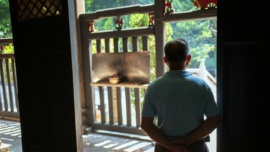The government has expressed its intention to review the current Economic Housing Law, setting penalty provisions for householders who leave their allocated economic units vacant, as the current law does not give the authorities the rights to do so. Government representatives, including the Secretary for Transport and Public Works Raimundo Rosario, met with the follow-up committee for the Public Administration Affairs of Legislative Assembly (AL) yesterday morning on the issue of vacant public housing. The government said that the AL committee had found it hard to enforce the uptake of economic units without related penalty provisions. The chairman of the AL committee, Chan Meng Kam, told reporters after the meeting of the parties that the government had consulted the Legal Affairs Bureau and Commission Against Corruption, enquiring whether the government is able to issue penalties related to the issue. However, both the departments indicated that the government has no conditions under which to penalise economic-housing awardees who leave their units vacant. As such, the government now suggests adding penalty provisions, by partly amending the current related regulations, or directly reviewing the whole Economic Housing Law, which the government actually prefers, according to the legislator. Nevertheless, the way the government will apply to fulfill its purpose will depend upon consultations, Mr. Chan said, indicating that the government had not provided any timeframe for the proposal. Lack of facilities Mr. Chan indicated that the vacant issue primarily applies to the Seac Pai Van Public Housing Group as the uptake rates of Weng Leng Building on the Peninsula, and Lakesides Building in Taipa, have reached 98 per cent and 91 per cent, respectively. In March, the city’s Housing Bureau revealed that about 20 per cent, or 1,457, of the 7,087 households allocated an economic unit had not yet moved into the units as at February, despite already collecting the keys. Yesterday, the government admitted that the issue of vacant economic housing is complicated, as some households are not taking up the units due to lack of facilities or they do not have an urgent need to move in. Some legislators on the committee also perceive that the vacancy issue is due to the dirth of auxiliary facilities in Seac Pai Van, advising that the government should thus not put its focus on amending the law for now. Meanwhile, the government replied that it would speed up the establishment of the auxiliary facilities for the Seac Pai Van housing group, promising they would consider these facilities when constructing a new public housing project in the future. The progress of these establishments will be submitted to the AL follow-up committee before the end of this term of AL on August 15, Mr. Chan said. In addition, the government claimed it would strengthen its inspections to check whether the current public unit householders have illegally leased or sold their units. The current Economic Housing Law does not regulate the length of period between the public unit awardees collecting the keys and their uptake of the units. It only prohibits the awardees from using the flats for non-residential uses, and regulates awardees may only sell or lease the units 16 years after allocation. On the other hand, for the city’s social housing, the government thinks that the vacancy issue is not serious as the delay in uptake of the units are due to the government’s long administrative procedures, the legislator said. Rosario: Planning for new urban areas not dependent upon public opinion Secretary for Transport and Public Works Rosario Raimundo perceives that it is not necessary for the government to decide the planning for the five new urban reclaimed zones based on public opinion. The Secretary said yesterday that residents may not understand the technical issues involved in planning. As such, the government would listen to professional opinions before making the final decision for the planning. The third public consulting session for the planning of the new urban areas will end on August 8. The Secretary said this is the last public consultation for the areas.
—
























